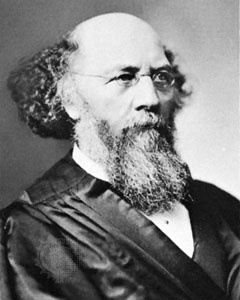Field, Stephen J
United States jurist
born Nov. 4, 1816, Haddam, Conn., U.S.
died April 9, 1899, Washington, D.C.
 associate justice of the U.S. Supreme Court and chief architect of the constitutional approach that largely exempted the rapidly expanding industry of the United States from governmental regulation after the Civil War. He found the judicial instrument for the protection of private enterprise principally in the Fourteenth Amendment (1868), which had been passed as a civil-rights measure. In his interpretation, the privileges and immunities of citizens secured by the amendment included the right to run a business without government interference, a view that prevailed in the court from the 1890s until the 1930s.
associate justice of the U.S. Supreme Court and chief architect of the constitutional approach that largely exempted the rapidly expanding industry of the United States from governmental regulation after the Civil War. He found the judicial instrument for the protection of private enterprise principally in the Fourteenth Amendment (1868), which had been passed as a civil-rights measure. In his interpretation, the privileges and immunities of citizens secured by the amendment included the right to run a business without government interference, a view that prevailed in the court from the 1890s until the 1930s.A graduate of Williams College, Williamstown, Mass. (1837), Field practiced law in New York City with one of his brothers, the legal reformer David Dudley Field. In 1849 he went to California, where he bought land in the Sacramento River gold-mining area, organized a town government, and became a state legislator and (in 1857) a state supreme court justice. Appointed by President Abraham Lincoln, Field sat on the U.S. Supreme Court from March 10, 1863, until Dec. 1, 1897, the second longest service in the court's history (after that of William O. Douglas).
Field spoke for the court when it invalidated federal and state loyalty oaths required after the Civil War. His opposition to interference with private enterprise came to the fore in the Slaughter-House cases, 16 Wallace 36 (1873), in which a state law granting a monopoly to a single livestock-butchering business was challenged by rival entrepreneurs as an infringement of their rights under the Fourteenth Amendment. Field dissented against the majority decision upholding the state law. The court eventually adopted his interpretation of the amendment's “due process” clause; corporations were regarded as persons whose liberty or property was not to be taken by the federal government (Fifth Amendment) or by the states (Fourteenth Amendment) without due process of law, the standard of which came to be so rigorous as to exclude governmental control. In joining the court majority that declared unconstitutional the federal income tax law of 1894, Field expressed fear of “a war of the poor against the rich.”
In 1880 and 1884 Field was a serious contender for the Democratic presidential nomination. His second candidacy was frustrated by party leaders in his own state because of his courageous upholding of the rights of California's Chinese minority.
- Thomas Shelton
- Thomas Sheraton
- Thomas Sheridan
- Thomas, Sidney Gilchrist
- Thomas S. Kuhn
- Thomas Southerne
- Thomas Spence
- Thomas Spencer Baynes
- Thomas Sprat
- Thomas Stanley
- Thomas Stanley, 1st earl of Derby
- Thomas Stanley Derby, 1st earl of
- Thomas Stewart Traill
- Thomas Stothard
- Thomas Sully
- Thomas Sumter
- Thomas Sydenham
- Thomas Tallis
- Thomas Telford
- Thomas, Theodore
- Thomas The Rhymer
- Thomas the Tank Engine
- Thomas, the Younger Warton
- Thomas Thorild
- Thomas Tickell